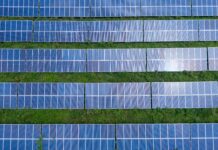Doug Young
Bottom line: The bankruptcy of Tianwei signals Beijing will allow a new round of failures for weaker solar panel makers, with Yingli and ReneSola the most likely to come under pressure.
News that solar panel material maker Baoding Tianwei is on the brink of collapse has sent shudders through the entire sector, as everyone guesses who might be next to fall in a looming new clean-up of China’s bloated industry. Tianwei has been in trouble for a while now, after the company became the first state-run firm to ever default on a domestic bond interest payment back in April.
That development certainly didn’t bode well for Tianwei, but it remained unclear if the local government or Beijing would ultimately step in to bail out the company and save its investors. Now we finally have the answer to that question, following media reports that Tianwei and 3 of its business units are formally filing for bankruptcy. (English article; Chinese article)
The bigger picture to this story is that Beijing now appears willing to let weaker and less efficient solar panel makers and their suppliers fail, in an effort to create a more solid foundation for the remaining stronger players. The government already allowed an earlier round of failures that included former giants Suntech and LDK, but no major closures have come since then. But that looks set to change now.
According to the latest reports, Tianwei announced its insolvency and inability to pay its debts on the website Chinamoney.com.cn, a website of the China Foreign Exchange Trade System. The company cited the slowdown in the broader global economy, as well as overcapacity in the solar panel sector for its decision.
Tianwei was traditionally a maker of electrical transformers, but more recently got into the business of making polysilicon, the main material used to makes solar panels. Such a move may sound puzzling to many westerners, but is actually quite common for big Chinese state-run companies that often rush into new business areas that Beijing sets as priority areas for development.
In this case, Tianwei and many other state-run firms piled into the solar sector, only to incur big losses when their mass action created a huge oversupply on the global market. Tianwei reported a loss of 10.14 billion yuan ($1.6 billion) last year, with total debt at 21 billion yuan, far higher than its total assets of 13 billion yuan.
Solar Sell-Off
Tianwei’s bankruptcy announcement sent shivers through stocks of US-listed solar panel makers, as investors worried over what the bankruptcy might mean for the rest of the sector. In this case it’s quite easy to tell which companies are the biggest sources of concern by looking at the magnitude of their share declines.
Leading that group was the wobbliest company, Yingli (NYSE: YGE), whose shares plunged 24 percent on the news. Yingli is one of the few major solar players that failed to return to profitability as the sector downturn eased, and previously warned that it could be in danger of going out of business. Adding to the worries, the company’s headquarters are also in the northern Chinese city of Baoding where Tianwei is based, indicating the local government may not step in to provide any relief.
The other big loser in the Friday sell-off was the loss-making ReneSola (NYSE: SOL), whose shares tumbled 14 percent to close below the symbolically significant $1 threshold. Most other solar companies also got caught up in the sell-off but to a smaller extent, with stronger names Canadian Solar (Nasdaq: CSIQ) and Trina (NYSE: TSL) both down by around 7 percent.
Shareholders are correct to be worried about weaker names like Yingli and Renesola, as these companies clearly could face growing difficulties if their financial situation continues to deteriorate. But I question the sell-off for the strong names like Canadian Solar, since these companies could be well positioned to buy up assets at bargain prices from failed companies like Tianwei and others that could soon follow into bankruptcy.
Doug Young has lived and worked in China for 15 years, much of that as a journalist for Reuters writing about Chinese companies. He currently lives in Shanghai where he teaches financial journalism at Fudan University. He writes daily on his blog, Young´s China Business Blog, commenting on the latest developments at Chinese companies listed in the US, China and Hong Kong. He is also author of a new book about the media in China, The Party Line: How The Media Dictates Public Opinion in Modern China.






